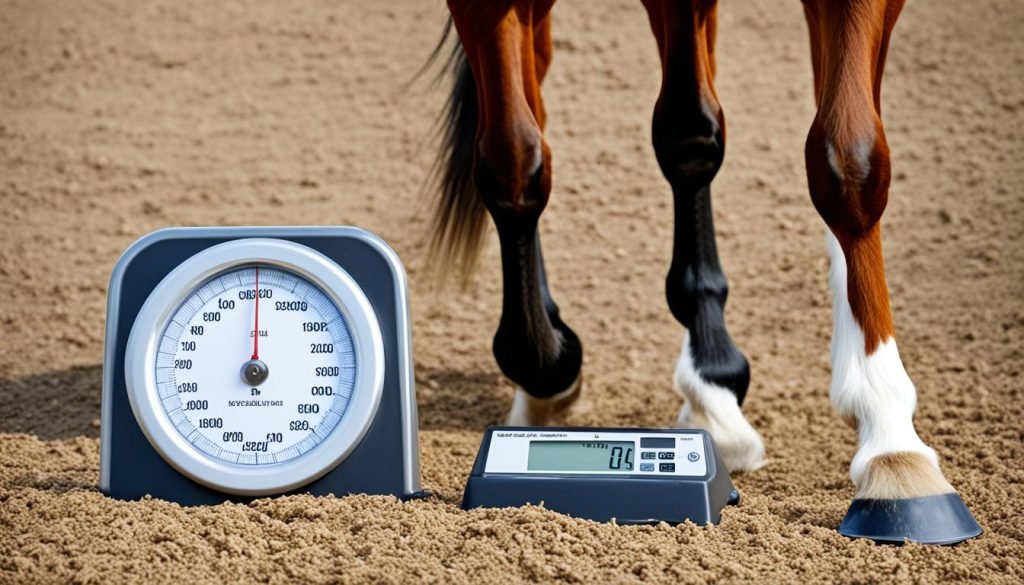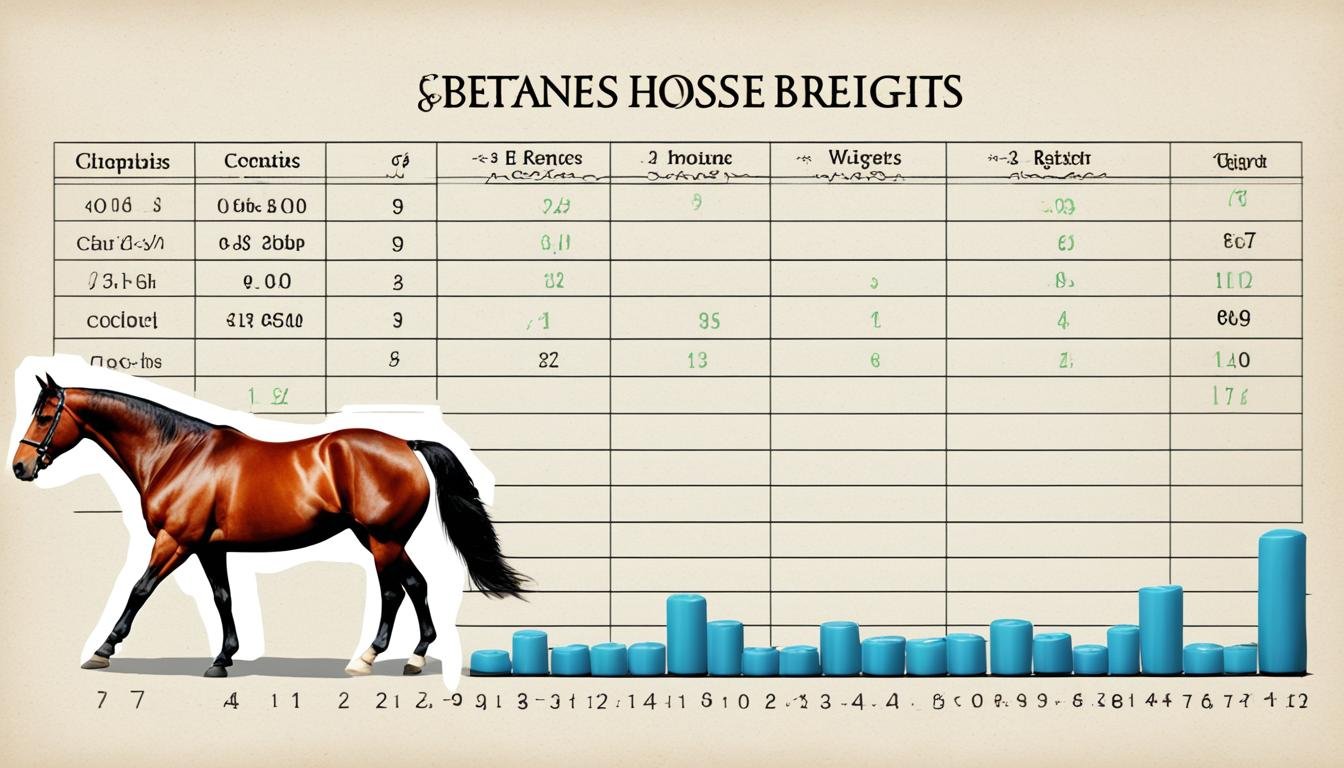How Much Do Horses Weigh? Average Equine Weights
Have you ever stood next to a majestic horse and marveled at its size and strength? Horses are incredible creatures, and their weight plays a crucial role in their overall well-being.
Whether you’re a horse owner, enthusiast, or just curious about these magnificent animals, understanding the average weight of horses is essential. It not only helps us appreciate their power but also enables us to provide them with the care they need for a healthy and happy life.
When it comes to horse weight, there is no one-size-fits-all answer. These equine beauties come in a variety of sizes and breeds, each with its weight range. From the petite and adorable miniature horses to the mighty draft horses, the weight of horses can vary significantly. Factors such as breed, health, and even diet can influence a horse’s weight.
By understanding what contributes to a horse’s weight and how to measure and manage it effectively, you can ensure your equine companion stays in a healthy weight range.
Join us as we explore the world of horse weights, discovering fascinating facts, practical tips, and essential insights to help you navigate this important aspect of equine care.

Key Takeaways:
- The average weight of a horse can range from 900 to 1,200 pounds, depending on factors such as breed and health.
- Miniature horses and ponies can weigh between 100 and 600 pounds, while draft horses can exceed 1,800 pounds.
- Diet, activity level, and certain health conditions can influence a horse’s weight, making it important to monitor and manage it proactively.
- Methods like weight tapes, body condition scoring, and livestock scales can help measure and estimate a horse’s weight.
- Maintaining a healthy weight range is crucial for a horse’s overall health, as both underweight and overweight horses are more susceptible to health issues.
Factors Affecting a Horse’s Weight
Many factors can influence a horse’s weight, including breed, age, gender, diet, activity level, and certain health conditions. Understanding these factors is crucial for effective horse weight management and maintaining optimal health and performance.
Breed: Different horse breeds have different average weights. Generally, lighter breeds weigh less than draft breeds. For example, Arabian horses are known for their slender build and average around 900 to 1,000 pounds, while Clydesdales, a draft breed, can weigh over 1,800 pounds.
Age: Age plays a role in a horse’s weight, with younger horses generally weighing less than adult horses. Foals are initially about 10% of their mother’s weight at birth and undergo rapid growth in the first few months of life.
Gender: Gender can also affect weight due to differences in muscle mass. Males usually weigh more than females because they tend to have more developed musculature.
Diet: Diet plays a significant role in managing a horse’s weight. A balanced and nutritious diet tailored to the horse’s needs is essential. High-fat or high-sugar diets can lead to weight gain and obesity. On the other hand, inadequate nutrient intake can result in weight loss and malnutrition.
Activity Level: The level of physical activity can impact a horse’s weight. Regular exercise helps maintain a healthy weight and promotes overall fitness. Horses with high activity levels require more calories to sustain their energy needs.
Health Conditions: Certain health conditions can affect a horse’s weight. Poor dental health can make it difficult for horses to effectively chew and process food, leading to weight loss. Conditions such as Cushing’s Disease and parasitic infestations can also impact weight due to their effects on metabolism and nutrient absorption.
To effectively manage a horse’s weight, it is important to consider these factors and work closely with a veterinarian. Regular monitoring, proper nutrition, and exercise are essential components of maintaining a healthy weight for a horse.
| Factors Affecting Horse Weight | Examples |
|---|---|
| Breed | Arabian horses, Clydesdales |
| Age | Foals, adult horses |
| Gender | Males, females |
| Diet | High-fat, high-sugar diets |
| Activity Level | Highly active horses, sedentary horses |
| Health Conditions | Poor dental health, Cushing’s Disease |
How to Measure a Horse’s Weight
When it comes to determining a horse’s weight, there are several measurement methods available for horse owners. While the most accurate method is using a livestock scale, this may not be practical for the majority of horse owners. Fortunately, there are alternative methods that can provide estimations and assist in monitoring a horse’s weight.
One popular method is using a weight tape designed specifically for horses. These tapes are placed around the horse’s chest, just behind the withers. By measuring the circumference of the horse’s chest, the weight tape provides an estimation of the horse’s weight.
Another method involves measuring the horse’s girth and using a weight calculation formula. This requires measuring the circumference of the horse’s girth—the area just behind the horse’s elbow—and measuring the length from the shoulder to the hip. By plugging these measurements into a weight calculation formula, an estimate of the horse’s weight can be obtained.
It’s important to note that these methods provide estimates and may vary depending on the horse’s body type. For accurate weight measurements, veterinarians often utilize livestock scales in hospital settings, especially for administering medications and anesthesia.
Regularly monitoring a horse’s weight is crucial for maintaining its overall health and well-being. By using these measurement methods, horse owners can stay informed about their horse’s weight and make necessary adjustments to their care routine.
Importance of Horse Weight for Health

The weight of a horse has a significant impact on its overall health and well-being. Maintaining a healthy weight range is crucial to prevent various health issues in horses.
Health Risks of Underweight Horses
Underweight horses are at risk of malnutrition, which can lead to weakened immune systems and increased susceptibility to diseases. They may also experience reduced muscle mass and decreased energy levels, impacting their ability to perform tasks effectively. Poor dental health is another contributing factor to weight loss in horses, as it hinders their ability to consume an adequate amount of food.
Health Risks of Overweight Horses
On the other hand, overweight horses are prone to several health conditions. Excessive weight can lead to problems such as laminitis, a painful inflammation of the hoof, equine metabolic syndrome, and joint issues. These conditions can severely impact a horse’s mobility, comfort, and overall quality of life.
Weight-Related Health Issues
Both underweight and overweight horses can experience a range of health issues. Underweight horses may suffer from nutrient deficiencies, impaired organ function, poor coat condition, and reduced fertility. Overweight horses, on the other hand, may develop insulin resistance, which can lead to diabetes and other metabolic disorders.
Proper Weight Management
To ensure optimal health, it is important to maintain a healthy weight range for horses. This can be achieved through proper nutrition and regular exercise. Feeding horses a balanced diet that meets their nutritional needs, without excessive amounts of high-fat or sugary foods, is crucial. Regular exercise helps horses maintain a healthy weight, improves their cardiovascular fitness, and promotes overall well-being.
It is recommended to consult with a veterinarian to determine a suitable weight management plan for individual horses. Regular veterinary check-ups are essential for identifying any weight-related issues early on and ensuring appropriate care.
Horse Weight Management Tips

Managing a horse’s weight is crucial for maintaining its overall well-being. Effective weight management involves a combination of regular exercise, a balanced diet, and proper monitoring. Here are some important tips to help you maintain a healthy weight for your horse:
1. Regular Exercise
Regular exercise plays a vital role in maintaining a healthy weight for your horse. It helps to prevent weight gain, improve cardiovascular health, strengthen muscles, and enhance overall fitness. Ensure your horse gets enough physical activity based on its breed, age, and ability. Providing daily turnout, engaging in regular riding sessions, and incorporating varied activities can help manage weight effectively.
2. Balanced Diet
A balanced diet tailored to your horse’s nutritional needs is essential for weight management. Work with a veterinarian or equine nutritionist to develop a diet plan that takes into account your horse’s breed, age, activity level, and overall health. Opt for quality forage, such as grass or hay, and consider adding appropriate supplements, if necessary. Feed according to recommended portions and avoid overfeeding, as excess calories can lead to weight gain.
3. Weight Monitoring
Regularly monitor your horse’s weight to ensure it stays within a healthy range. There are several methods you can use:
- Weight Tapes: Use weight tapes specifically designed for horses to measure their weight. These tapes provide a rough estimation of the horse’s weight based on its girth measurements.
- Body Condition Scoring: Assess your horse’s body condition by evaluating specific areas like the ribs, neck, and tail head. Use body condition scoring charts to assign a score that indicates the ideal weight range.
- Professional Scales: If available, consider weighing your horse on a professional livestock scale for accurate measurements.
Regular weight monitoring allows you to detect any changes in your horse’s weight and address them promptly.
4. Veterinary Guidance
Regular veterinary check-ups play a crucial role in maintaining your horse’s weight and overall health. A veterinarian can provide valuable advice on managing your horse’s weight, addressing specific dietary needs, and identifying any underlying health issues that may affect weight management. Regular health examinations, vaccinations, and dental care are also essential components of maintaining a healthy horse weight.
Remember, each horse is unique, and weight management strategies may vary. Consult with professionals and continually assess your horse’s weight to ensure its well-being and longevity.
Seasonal Weight Fluctuations
Horses, like many animals, experience fluctuations in weight throughout different seasons. These seasonal changes can be attributed to various factors that impact a horse’s weight.
Summer Weight Gain in Horses
During the summer months, horses may experience weight gain. This can be attributed to the abundance of rich pasture available for grazing. The favorable weather conditions also contribute to higher levels of activity, leading to increased calorie consumption and weight gain.
Winter Weight Loss in Horses
Conversely, horses tend to lose weight during the winter season. The colder temperatures increase their energy requirements to stay warm, resulting in higher calorie expenditure. Limited access to fresh pasture and reduced activity levels also contribute to weight loss during this time.
Horse owners must monitor their horse’s weight during seasonal changes, especially for senior horses who may be more susceptible to weight loss. Adjustments to diet and exercise may be necessary to maintain a healthy weight throughout the year.
Horse Body Condition Scoring
The assessment of a horse’s weight and overall body fat is crucial for maintaining its health and well-being. One effective method used by horse owners and veterinarians is horse body condition scoring.
This scoring system involves evaluating specific areas of the horse’s body, which include the neck, withers, shoulder, back, ribs, and tail head. By visually and physically examining these areas, a score on a scale of 1-9 is assigned to assess the horse’s body condition.
Developed by Don Henneke in the 1980s, the Henneke horse body condition score (BCS) is widely used and recognized in the equine industry. The Henneke BCS scale ranges from 1 (extremely emaciated) to 9 (extremely obese), with an ideal body condition score typically falling between 4 and 6, depending on the horse’s breed and specific circumstances.
A score of 1 indicates severely underweight, while a score of 9 indicates extremely overweight. The various score ranges in between help determine the horse’s body condition and guide nutrition and management decisions.
Determining the Ideal Horse Weight Range:
- Score 1-2: Horses in this range are underweight, with prominent ribs, easily visible bony structures, and poorly defined muscle tone. It is essential to address the nutritional needs of these horses to ensure their health and well-being.
- Score 3-4: Horses in this range have a moderate body condition, with discernible ribs and a slight fat layer over the top of their spinous processes. They have a healthier appearance compared to underweight horses but may still require some nutritional adjustments.
- Score 5-6: Horses in this range have an ideal body condition, with ribs that are easily palpable but not visually prominent. Their back appears well-rounded, and a thin layer of fat covers their spinous processes, with a smooth appearance overall.
- Score 7-8: Horses in this range are overweight, with increased fat deposits over their ribs, shoulders, neck, back, and tail head. Their ribs are not easily felt, and they lack visible muscle definition.
- Score 9: Horses in this range are excessively obese, with heavy fat deposits over their entire body. Their ribs and other bony structures are completely covered, and they have a round, bulging appearance.
| Body Condition Score | Description |
|---|---|
| 1 | Emaciated |
| 2 | Very thin |
| 3 | Thin but healthy |
| 4 | Moderate body condition |
| 5 | Good condition |
| 6 | Moderate to fleshy |
| 7 | Fleshy |
| 8 | Very fleshy |
| 9 | Obese |
“Assessing a horse’s body condition allows us to make more informed decisions about their care and well-being. By regularly monitoring their weight and body fat, we can provide appropriate nutrition and management strategies to keep our equine partners healthy and happy.” – Dr. Sarah Johnson, Equine Veterinarian
Weight’s Impact on Horse Performance
A horse’s weight plays a significant role in its performance and overall well-being. Whether a horse is overweight or underweight, it can face performance issues that affect its ability to excel in various tasks.
Overweight horses, carrying excess weight, often struggle with endurance and cardiovascular health. The extra pounds put additional strain on their heart and respiratory system, reducing their stamina and hindering their performance. In the long run, this can lead to serious heart health issues and decrease their overall athletic potential.
On the other hand, underweight horses face a different set of challenges. Without sufficient calories and proper nutrition, they may lack the energy required to sustain work and perform at their best. Their decreased performance can be attributed to a lack of muscle mass and reduced strength, making it difficult for them to meet the demands of their workload.
To ensure optimal performance, it is crucial to maintain a healthy weight range that is specific to the horse’s breed and activity level. Different horses have different ideal weight ranges, and it is essential to work with equine professionals, such as veterinarians and nutritionists, to determine and maintain the appropriate weight for each horse.
Regular monitoring of a horse’s weight is key to understanding its performance potential. By regularly assessing a horse’s weight and body condition, adjustments to diet and exercise can be made to achieve and maintain a healthy weight. This will help maximize the horse’s performance and ensure its long-term health.
Striking the right balance and maintaining a healthy weight is crucial for every horse, regardless of its discipline or purpose. By prioritizing weight management, horse owners can help their equine companions perform at their best and enjoy a long and successful career.
Final Thoughts
The weight management of horses plays a crucial role in their overall health and well-being. By monitoring and controlling a horse’s weight, owners can ensure proper care and enhance their equine companion’s performance. Various factors, including breed, age, gender, diet, and activity level, influence a horse’s weight, emphasizing the importance of individualized weight management strategies.
Accurate weight measurement methods such as weight tapes, body measurements, and livestock scales allow owners to track their horse’s progress effectively. It is essential to maintain a healthy weight range for horses, as both underweight and overweight horses are prone to health issues. Regular exercise, coupled with a balanced diet tailored to the horse’s nutritional needs, is crucial for maintaining a healthy weight.
Veterinary check-ups provide valuable guidance in managing a horse’s weight and addressing any underlying health concerns. By proactively prioritizing a horse’s weight, owners can ensure optimal care and longevity for their equine companions. Maintaining a healthy horse weight not only promotes physical well-being but also enhances the horse’s overall quality of life and performance.
FAQ
How much do horses weigh?
The average weight of a horse ranges from 900 to 1,200 pounds.
What factors influence a horse’s weight?
Factors such as breed, age, gender, diet, activity level, and certain health conditions can influence a horse’s weight.
How can I measure a horse’s weight?
You can measure a horse’s weight using methods like weight tapes, body condition scoring, or livestock scales.
Why is horse weight important for their health?
Horse weight is crucial for overall health, as both underweight and overweight horses are prone to health issues.
How can I manage my horse’s weight?
Horse weight management can be achieved through proper exercise, a balanced diet, and regular veterinary check-ups.
Do horses experience weight fluctuations during different seasons?
Yes, horses may experience weight fluctuations during different seasons due to factors such as pasture availability and energy requirements.
What is body condition scoring for horses?
Body condition scoring is a tool used to assess a horse’s weight and overall body fat, helping guide nutrition and management decisions.
How does a horse’s weight impact its performance?
A horse’s weight directly impacts its performance, with both overweight and underweight horses facing performance challenges.
What are the key takeaways for horse weight management?
Key takeaways for horse weight management include maintaining a healthy weight range, proper nutrition, and regular monitoring through veterinary check-ups.







